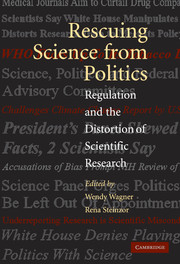Book contents
- Frontmatter
- Contents
- About the Contributors
- Acknowledgments
- Prologue
- Introduction: Principled Science
- PART I FREEDOM AND INDEPENDENCE
- PART II TRANSPARENCY AND HONESTY
- PART III A PUBLIC INFRASTRUCTURE FOR SCIENCE
- 10 Politicizing Peer Review: The Scientific Perspective
- 11 Politicizing Peer Review: The Legal Perspective
- 12 The Government Role in Scientific Research: Who Should Bridge the Data Gap in Chemical Regulation?
- PART IV RECOMMENDATIONS AND CONCLUSION
- Index
10 - Politicizing Peer Review: The Scientific Perspective
Published online by Cambridge University Press: 04 August 2010
- Frontmatter
- Contents
- About the Contributors
- Acknowledgments
- Prologue
- Introduction: Principled Science
- PART I FREEDOM AND INDEPENDENCE
- PART II TRANSPARENCY AND HONESTY
- PART III A PUBLIC INFRASTRUCTURE FOR SCIENCE
- 10 Politicizing Peer Review: The Scientific Perspective
- 11 Politicizing Peer Review: The Legal Perspective
- 12 The Government Role in Scientific Research: Who Should Bridge the Data Gap in Chemical Regulation?
- PART IV RECOMMENDATIONS AND CONCLUSION
- Index
Summary
The Role of Peer Review
Peer review, or independent review by experts, is an important but limited mechanism for quality control within the scientific enterprise. While it has many manifestations, peer review generally involves a review of materials by experts who are thought to have adequate knowledge and technical expertise to judge the material's quality, while being sufficiently impartial and disinterested to provide judgment free of conflict of interest.
Peer review plays an important role in the production and shaping of the scientific knowledge that is the product of the current scientific enterprise. This enterprise is one in which, at least in theory, scientists are constantly evaluating and building upon each other's works through a continual system of experimentation, publication, dissemination, replication, and further experimentation. Peer review may be performed in at least two aspects of this process: in the decision-making processes of agencies and institutions that provide financial support for scientific research, and in the editorial prepublication assessment of manuscripts submitted to scientific journals (often called “refereeing”). There is significant competition both for space in prestigious journals and limited research funds, and peer review plays a pivotal role in allocation of both of these highly valued resources.
Beyond these two models of peer review, in recent years there has been a growing interest in a new, distinct function for peer review: an evaluation of analytical and synthetic documents prepared by governmental agencies, often in support of regulatory programs.
- Type
- Chapter
- Information
- Rescuing Science from PoliticsRegulation and the Distortion of Scientific Research, pp. 219 - 237Publisher: Cambridge University PressPrint publication year: 2006
- 2
- Cited by

